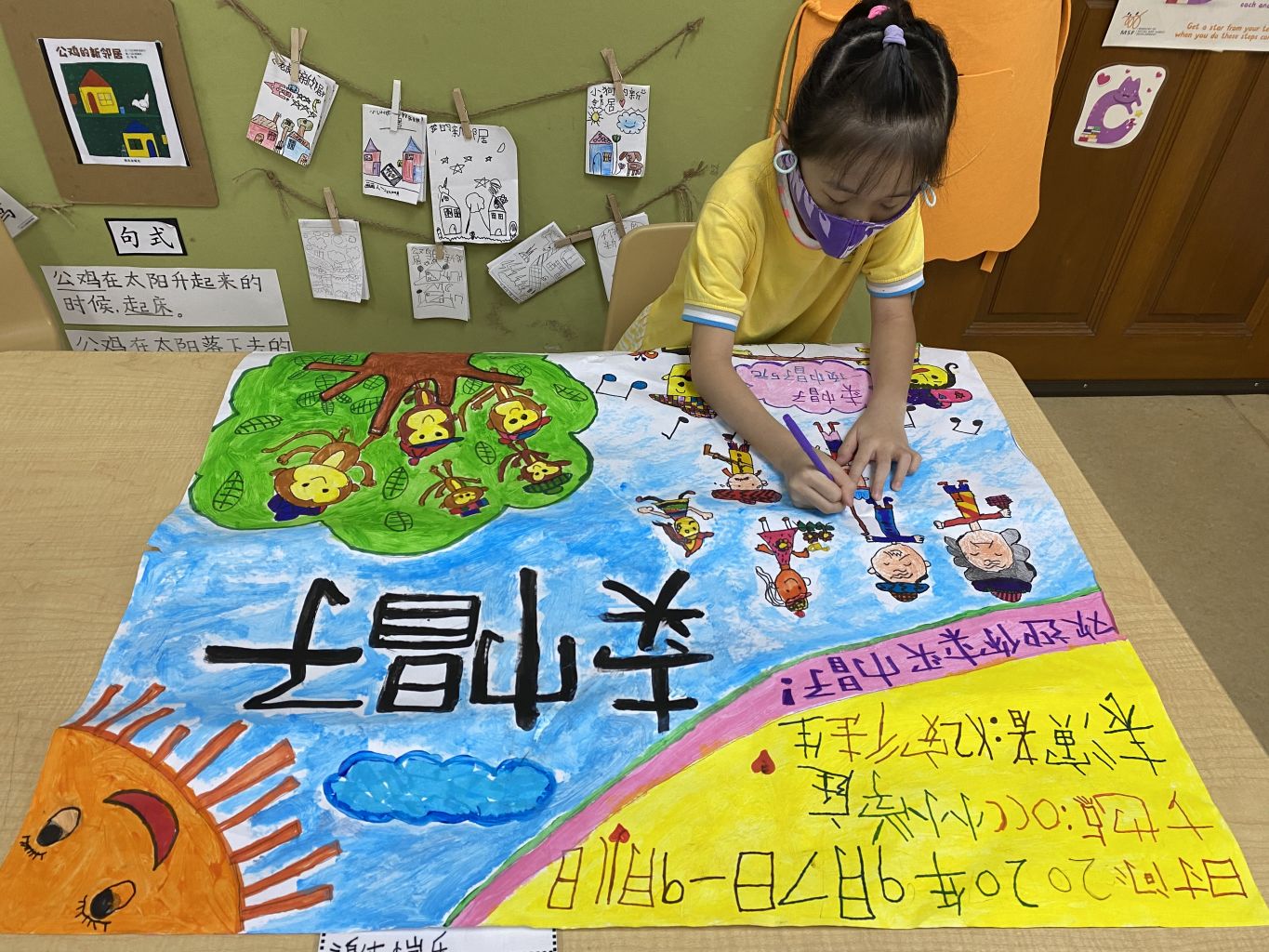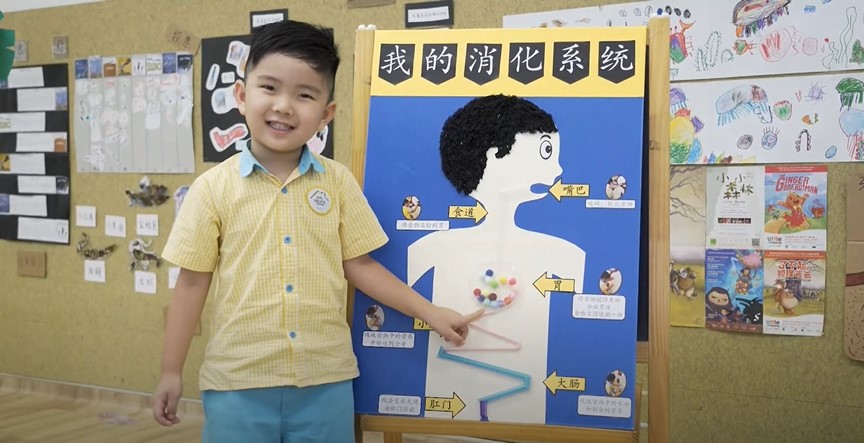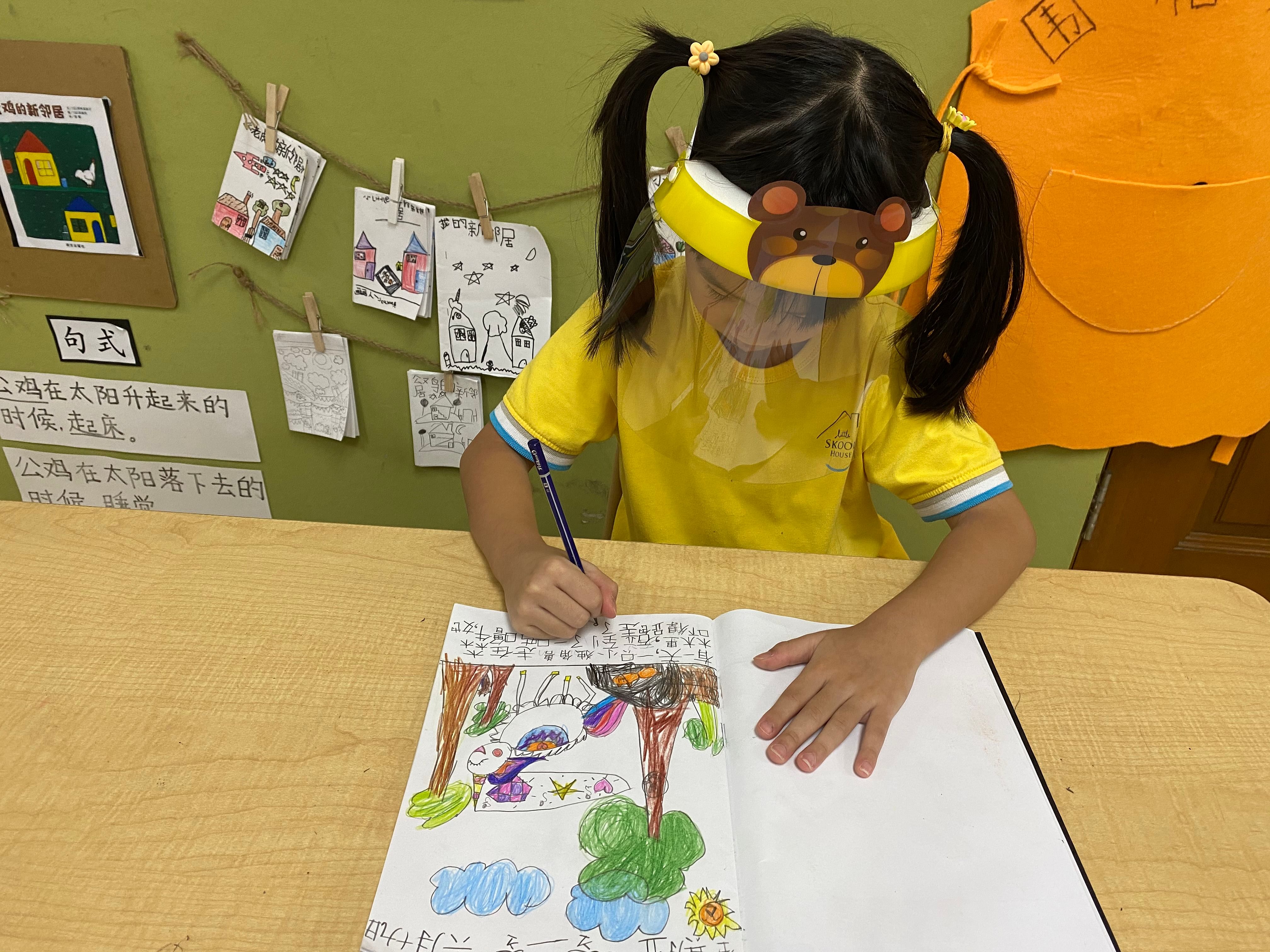BRANDED CONTENT
How Little Skool-House transforms Chinese learning for pre-school students
An NTU study finds that nine in 10 of students of Little Skool-House are highly proficient in both Mandarin and English

A child creating posters for a Chinese theatre production, as part of a learning technique taught under LSH's Pedagogy for Enhanced Mandarin Acquisition programme. PHOTO: LITTLE SKOOL-HOUSE
In the 1990s, four in 10 Chinese households with Primary 1 children spoke mostly English at home. The figure has since risen to 71 per cent today, according to the Ministry of Education.
This new reality may not be making the learning of Mandarin easier for our young, but new methods of teaching the language have been developed to make it possible for students to enjoy their Chinese lessons and improve their command of the language.
Little Skool-House's (LSH) Pedagogy for Enhanced Mandarin Acquisition programme is one such example.
Dr Jasmin Lim's four-year-old son had been struggling with Mandarin due to a predominantly English-speaking home environment.
"Expressing himself in his mother tongue does not come naturally to him," she says.
While her son has been attending the LSH's programme since 2018, it was during his daily Zoom lessons during the circuit breaker that Dr Lim observed a marked improvement in his command of the language.
She shares: "During one lesson, his teacher conducted a sausage roll baking activity entirely in Mandarin. I was happy to see that my child could follow the instructions and express in Mandarin how he felt about the activity!"
Dr Lim is not the only parent who has seen their children embrace their mother tongue since being introduced to the programme, which spans from Nursery 2 (four years old) to Kindergarten 2 (six years old). This follows the preceding induction of Mandarin for LSH's Infant and Toddler curriculum (two months old and up).
The three pedagogy pillars
In a Nanyang Technological University (NTU) study on Literacy Development at Little Skool-House done between 2018 and 2019, cognitive psychologist Dr Seetoh Pei Pei found that 93 per cent of LSH's students are highly proficient in both Mandarin and English.
According to LSH deputy general manager Coreen Soh, this is a result achieved without rote memorisation or the repetitive drills of writing Chinese characters.
Instead, the pre-school's Pedagogy for Enhanced Mandarin Acquisition programme encourages children to adopt Mandarin as a way of life through hands-on activities and critical thinking exercises.
The curriculum is developed by Mandarin pedagogy expert Dr Connie Lum, who is a member of the Lee Kuan Yew Bilingualism Funding Proposal committee and author of 30 published books on teaching Mandarin. It is framed around three pillars comprising the technical aspects of Mandarin, such as vocabulary and grammar, as well as an emphasis on "living" the language in order to fluently articulate thoughts and ideas.

Students start with Pillar One, which builds vocabulary, grammar, pronunciation and sentence structure through comprehension.
Under Pillar Two, they are immersed in real-life scenarios by highly-trained teachers who are able to identify and tap on the interests of individual students. The teachers undergo a rigorous programme designed by LSH that includes learning journeys to Beijing, Taiwan and Hong Kong, a mentorship stint, on-the-job coaching and extensive theatre training to help them conduct engaging classes.
Finally, Pillar Three transitions from everyday topics to more complex ideas under the school's Builders and Innovation Project. Students lead an inquiry-based assignment that allows them to hypothesise and discuss research methodology, conduct research, interviews and experiments, and draw conclusions based on their findings - all by conversing in Mandarin. Some examples of investigative topics include "why do we need to wash our hands" or "how do you filter water".
By communicating their ideas verbally and on paper, children are exposed to new vocabulary and are given the opportunity to improve their language skills as they develop critical thinking abilities.

Says Ms Soh: "The Builders and Innovation Project allows children to investigate topics such as researching the function of our digestive system. They are encouraged and guided by teachers through skilled questioning to help them put together their thoughts into original ideas.
"This process helps the children to piece information and connect ideas. This way, our students apply the Mandarin language purposefully."
Show and tell
For parent Jeffrey Poh, his seven-year-old daughter's grasp of Mandarin improved greatly after attending lessons at the pre-school. She developed a keen interest in the language during her enrolment in 2019.
"The teachers at LSH do not shy away from employing creative methods to cultivate the children's interest in academics, and that makes them eager to learn more with their friends. For example, Arielle's teacher, Ms Yu, would guide students in growing a plant as an introduction to a Chinese storybook, which talks about the life cycle," he says.

Arielle's teachers use a learning technique called the Full Cycle Chinese Theatre Pedagogy, where students are offered the chance to choose a Mandarin storybook that they will adapt and produce for a play.
This child-driven activity lets the students lead their own drama production - from advocating for a role and composing their own adaptations of the story, to designing their own sets and costumes, selling their own tickets and sharing their personal self-reflections on these learnings.
It is an experience that helps them apply Mandarin to problem solving and communicating, while relaying the importance of the language.
Aside from hands-on activities, students are also given a weekly journal to write their reflections on any topic - an exercise that eschews the typical rote learning drills and provides an emotional outlet for the children.
Beyond the classroom
LSH strongly believes in cultivating a love of Mandarin during a child's foundational years, so they will retain interest in the language well beyond their time with the school. This involves working closely with parents to engage their children in Mandarin at home.

"We share weekly plans, focus topics, new words, resources like songs and rhymes, and learning-at-home ideas for parents through our Parent Portal. We will curate take-home kits to support parents in home-school activities in Mandarin during every term," says Ms Soh.
The pre-school's dedication to their students is exemplified by their teachers, which Mr Poh can attest to.
"Ms Yu gave us some tips before Arielle graduated from Kindergarten 2, as she was concerned that Arielle wouldn't retain interest in the language. Ms Yu advised that one of us should always communicate in Mandarin, and we should ensure a balance of exposure to media from both languages.
"She would also go the extra mile to contact Arielle once in a while and check if she is coping well with the primary school syllabus. She even encouraged Arielle to reach out if she needed advice in mastering the language," he says.
For more details on Little Skool-House's Pedagogy for Enhanced Mandarin Acquisition programme, visit their website here.


